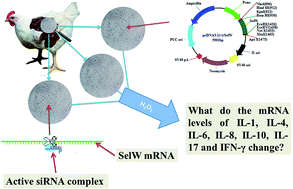SelW regulates inflammation-related cytokines in response to H2O2 in Se-deficient chicken liver
Abstract
Selenium (Se) deficiency-induced liver damage is related to oxidative stress, and the alternative transcription of cytokines has been linked to liver disease. Selenoprotein W (SelW) is known to play an antioxidant role in mammals, but chicken SelW does not possess a cysteine at residue 37 that is required for the presumed antioxidant function in mammals. The relationship between SelW and cytokines in H2O2-mediated chicken liver damage remains unclear. To investigate the protective role of SelW against H2O2 by influencing the expression of cytokine mRNAs, SelW was overexpressed or/and knocked down in cultured chicken liver cells. After the cells were exposed to H2O2, the levels of interleukin (IL)-1, IL-6, IL-8, IL-17, IL-4, IL-10 and IFN-γ were lower in the SelW over-expressing cells but higher in the SelW knockdown cells compared to the H2O2-only treatment group. Meanwhile, chicken were fed with a Se-deficient granulated diet containing 0.032 mg kg−1 Se for 15, 25, 35, 45 and 55 days, and the results showed that IL-1, IL-6, IL-8, IL-17, IL-4, IL-10 and IFN-γ in Se-deficient chicken liver and serum were dramatically higher than the normal control group. In conclusion, our findings suggested that SelW regulated inflammation-related cytokines during H2O2-dependent chicken liver damage.


 Please wait while we load your content...
Please wait while we load your content...